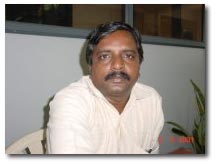
Hello Life
Improving the lives of people worldwide
|
|
Hello Life Improving the lives of people worldwide |
|
|
Elango's model Self-reliance and Good Governance in every village
Click here to read HelloLife.org's Spotlight October 2002: An interview with Elango
In the village of Kuthambakkam 35 km west of Chennai in India, a 40-year old chemical engineer-turned-village-leader is quietly demonstrating the feasibility of Gram Swaraj (Village Self-rule) -- a Gandhian development philosophy rooted in self-sustenance, economic autonomy and self-governance.
Kuthambakkam epitomizes all that ails Indian villages: the divide between the rich and poor, the abject poverty of the have-nots, the mechanization of farming operations that has resulted in further loss of employment for landless laborers. Almost 87% of land in the village is owned by rich landlords from a single hamlet. Eight years ago, the village was beset with communal riots between the Dalit and non-Dalit communities. Infrastructure and sanitary conditions were poor. Kuthambakkam ranked 22nd among 12,619 villages in Tamil Nadu in illicit liquor brewing, which employed 35% of the population.
Into this scenario entered Elango. Mr. Rangaswamy Elango was born into a Dalit farmer's family in Kuthambakkam in 1960, and like any other educated village youth, he dreamt of moving out of his village into the city to a well-paying job. His hard work earned him a degree in Chemical Engineering, after which he went onto becoming a scientist at the Central Electro Chemical Research Institute (CECRI), where he worked for eight years.
As a CECRI scientist, Elango assisted Kundrakudi Adigalar (a Hindu saint) in a rural reconstruction project in Kundrakudi, a village near Madurai in Tamilnadu. His involvement in the project, as well his periodic visits to his family in Kuthambakkam, brought him face to face with rural reality and inspired him to read Gandhian literature. As his true vocational calling turned stronger, he finally left his job in 1994 and returned to Kuthambakkam for good.
He tried to convince the villagers dependent on liquor brewing to move to alternative sources of livelihood. He planned some short-term jobs and orientation programs for them, but initially his efforts were unsuccessful. The people did not accept Elango, nor were they ready to respond to his efforts to improve their lives. All they wanted was a steady flow of money. Elango came to the conclusion that steady long-term employment was the only way to lift the villagers’ dependence on illicit distillation. Then in 1996 he successfully contested in the village Panchayat elections as an independent candidate.
After his election, Elango was able to provide his villagers with sustainable employment through government schemes, engaging them in development works like building hand-made bricks to construct houses. Now many village women are engaged in producing products out of jute, textiles, and leather. Kuthambakkam also has a new dairy processing unit that has made much of the costs of transportation, pasteurization and packaging disappear while creating local jobs.
Elango visited and studied several experiments in rural development across India. He also traveled extensively across Tamil Nadu and identified around 400 honest, committed Panchayat leaders (leaders of the village self-rule committee), united by their dream of a strong, self-sustaining village. Through the 'Panchayat Academy', other village leaders could gain exposure to village reconstruction and the working model of a local village economy.
At the end of his first term of five years, Elango was reelected in the 2001 elections. The unique feature of this election was that he spent no money on campaigning for himself. He is currently working on establishing a land / agriculture-based local economy in Kuthambakkam, along the lines of the model of J.C.Kumarappa, the Gandhian economist. The Panchayat has deposited Rs 100,000 towards a high school for the village, to reduce the drop out rate that is high because of the distance of the nearest school from the village. Elango has also established a Trust for Village Self-Governance (TVSG).
The village now has self help groups for women, an information center and computer education facilities, and is moving towards a computerized administration. Earlier this year the villagers put up locally made products for sale on the Internet, and a Japanese buyer placed orders worth $4,000 for leather bags and other items. Elango’s vision of a village that is self-sustained and yet modern may yet bear fruit, although the government has not done enough to encourage and fund e-governance.
See http://www.samanvaya.com/gramswaraj for more information on Elango and his work He may be contacted at panchayat@yahoo.com HelloLife.org thanks Sangeetha Sriram for sending us this story |